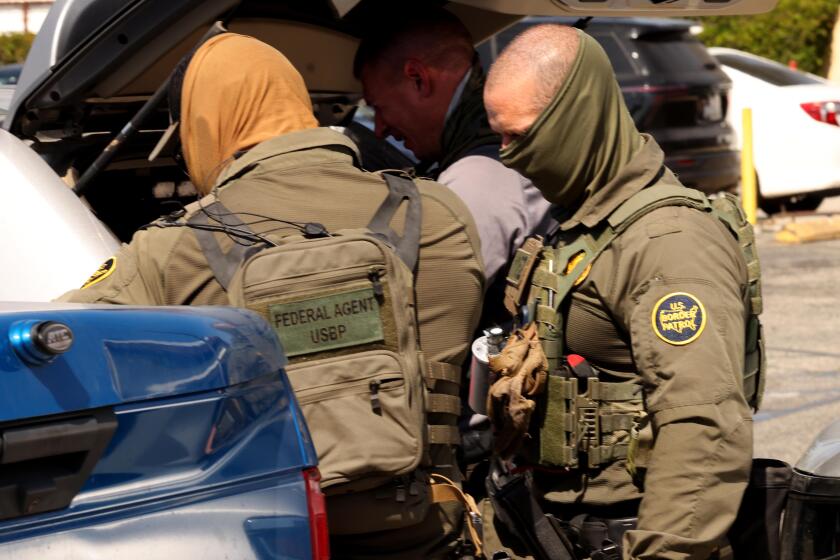The 9th U.S. Circuit Court of Appeals dealt a stinging blow to the Trump administration’s mass deportation project Friday night in a fiery opinion upholding a lower court’s block on “roving patrols” across much of Southern California.
“If, as Defendants suggest, they are not conducting stops that lack reasonable suspicion, they can hardly claim to be irreparably harmed by an injunction aimed at preventing a subset of stops not supported by reasonable suspicion,” the panel wrote.
The ruling leaves in place a temporary restraining order barring masked and heavily armed agents from snatching people off the streets of Southern California without first establishing reasonable suspicion that they are in the U.S. illegally.
Under the 4th Amendment, reasonable suspicion cannot be based solely on race, ethnicity, language, location or employment, either alone or in combination, U.S. District Judge Maame Ewusi-Mensah Frimpong of Los Angeles wrote in her original order.
Read more: Federal judge halts indiscriminate immigration stops in Los Angeles and beyond
9th Circuit Judges Marsha S. Berzon, Jennifer Sung and Ronald M. Gould agreed.
“There is no predicate action that the individual plaintiffs would need to take, other than simply going about their lives, to potentially be subject to the challenged stops,” the opinion said.
Fourth Amendment injunctions are hard to win, experts say. Plaintiffs must show not only that they were hurt, but that they are likely to be hurt again in the same way in the future.
One way to meet that test in court is to show the injury is the product of a government policy. Throughout a hearing Monday, the appellate judges repeatedly probed that question, roughly doubling the administration’s time to respond in an effort to get an answer.
“After the district court injunction here, the secretary of Homeland Security said, ‘We are going to continue doing what we’re doing’ — so that’s not a policy?” Berzon asked.
“The policy is to follow the 4th Amendment and to require reasonable suspicion,” said Deputy Assistant Atty. Gen. Yaakov Roth.
Read more: Chokeholds, bikers and ‘roving patrols’: Are Trump’s ICE tactics legal?
Roth also rebuffed questions about a 3,000-arrests-per-day quota first touted by White House Deputy Chief of Staff Stephen Miller in May.
In a memo to the panel on Wednesday, Roth clarified that “no such goal” had been established.
The court rejected that argument Friday, writing that “no official statement or express policy is required” to prove one exists.
“Agents have conducted many stops in the Los Angeles area within a matter of weeks … some repeatedly in the same location,” the opinion said, making the likelihood of future stops “considerable.”
The ruling scolded the Department of Justice for “misreading” the restraining order it sought to block, and said it “mischaracterized” Judge Frimpong’s order. And it rejected the government’s central claim that its law enforcement mandate would be “chilled” by the district court’s order.
Read more: Trump administration asks appeals court to lift restrictions on SoCal immigration raids
“Defendants have failed to establish that they will be ‘chilled’ from their enforcement efforts at all, let alone in a manner that constitutes the ‘irreparable injury’ required to support a stay pending appeal,” the panel wrote.
The case is still in its early phases, with hearings set for a preliminary injunction in September. But the “shock and awe” campaign of chaotic public arrests that first gripped Southern California on June 6 has all but ceased in the seven counties covered by Frimpong’s order: Los Angeles, Riverside, San Bernardino, Orange, Ventura, Santa Barbara and San Luis Obispo.
“The underlying 4th Amendment law is not complicated,” said Mohammad Tajsar of the ACLU of Southern California — part of a coalition of civil rights groups and individual attorneys challenging cases of three immigrants and two U.S. citizens swept up in chaotic arrests. “Even a more conservative panel would have been concerned about what the government is doing.”
Read more: Stephen Miller finally gets his revenge on L.A.
Los Angeles Mayor Karen Bass, whose city was among a number of Southern California municipalities allowed to join the lawsuit this week, celebrated the news at a hastily arranged press conference late Friday night at Getty House, her official residence in Windsor Square.
The mayor strode out of her Tudor Revival-style home and toward the bank of waiting television cameras with a purposeful smile.
“This is a great day for Los Angeles,” she said, characterizing the court’s decision as a victory upholding the Constitution and affirming the rule of law.
Upholding the temporary restraining order “means that people cannot be snatched off the street by masked men like we had experienced for almost two months in the city,” Bass said, referencing the fact that the increasingly aggressive raids have often been carried out by masked agents who sometimes use unmarked vehicles.
Bass, whose late husband was Latino and whose late daughter, stepchildren and grandchildren are of Latino descent, has described the raids as deeply personal.
Speaking directly to the city’s immigrant community, Bass was sanguine about the possibility that the terror paralyzing local communities might begin to ebb.
“The message that I have is that I hope that feeling of fear will subside, that people will be willing and able to come out of their homes, that people will be able to go back to work, that our economy will begin to pick up again,” Bass said.
The Trump administration has previously signaled its intent to fight judicial limits on its deportation efforts any way it can. It was not immediately clear where an appeal would proceed. Bass said she believed the administration would likely appeal to the Supreme Court.
This story originally appeared in Los Angeles Times.

